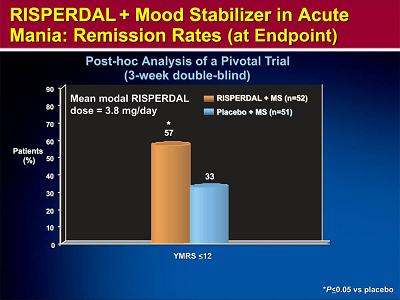Mood Stabilizer + Antipsychotic for Bipolar
This slide-, taken from a drug company program- like many others-- shows that using a mood stabilizer + antipsychotic is better than mood stabilizer alone.
Look carefully. This is what is wrong with psychiatry.

As you can see, Risperdal + Depakote (orange) is better than Depakote alone (blue.)
This is not a finding unique to Risperdal. Every antipsychotic has virtually identical data for adjunctive treatment, which is good, because they shouldn't have different efficacies.
So given that 8 other drugs have identical findings, these data suggest that, essentially, two drugs are better than one.
That's obvious, right? That's what the picture shows? Well, here's what's wrong with psychiatry: without looking at the slide, tell me what the y-axis was. Write it here:______________
The problem in psychiatry is that no one ever looks at the y-axis. We assume that the y-axis is a good one, that whatever measure used is worthwhile. We assume that the y-axis has been vetted: by the authors of the study, by the reviewers of the article, by the editors of the journal, and by at least some of the readers. So we focus instead on statistical significance, study design, etc. Well, I'm here to tell you: don't trust that anyone has vetted at anything.
The y-axis here is "% of patients with a YMRS <12." What's a YMRS? A mania scale. But what is a 12? Is it high? Low? What's the maximum score? What counts as manic? What questions does the YMRS ask, how does it measure the answers? You don't know? Again-- we figure someone else vetted it. The YMRS is a good scale because that's what scale we use.
Forget about the YMRS-- what does "% of patients" mean? If this is an efficacy in adjunct treatment study, why not have the y-axis be just the YMRS, to show how much it went down with one or two drugs?
Because that's the trick. This y-axis doesn't say "people got more better on two drugs." It says, "more people on two drugs got better."
Pretend you have a room with 100 manics. You give them all Depakote, and 30% get better. Now add Risperdal-- another 30% get better. But that doesn't mean the Depakote responders needed Risperdal, or the Risperdal responders needed Depakote-- or the other 40% got anything out of either drug.
It could be true that the effects are additive-- but this study doesn't show that. No study using "% of patients" can speak to synergistic effects. In other words, these studies do not say, "if you don't respond to one drug, add the second." They say, "if you don't respond to one drug, switch to another drug." They don't justify polypharmacy. They require trials at monotherapy.
So you may ask, well, do two drugs lower mania better than one drug, or not?
Depending what week you look at, MS alone reduces the score by 13; two drugs gives you another 3-6 points. On an 11 question scale, rated 0-4. So no, it's not better.
I have yet to meet someone who doesn't interpret these studies as supportive of polypharmacy, and it's not because they aren't critical. The reason for the blindness is the paradigm: they think-- want-- the treatment of bipolar to be the same as the treatment of HIV, or cancer, or pregnancy. The important difference is that these other diseases are binary: once you get them, nothing you do makes it worse. Take pregnancy. If two chemicals combined lower the rate of pregnancy, it is clearly worth it to take both. One chemical might have been enough, but who wants to find out? So you take the risk, and you eat both. This is also my argument against making Plan B OTC. Bipolar is not like this: if one or two drugs in succession fail, or things get bad, you can always resort to polypharmacy later.
Again, it may be true that polypharmacy is necessary. Maybe 3-6 points are needed. Maybe two drugs gets you better faster. But it can't be the default, it can't be your opening volley. Because I can't prove two drugs are better than one, but I can prove they have twice as many side effects, and are twice as expensive.
At minimum, if polypharmacy is successfully used to break an acute episode, you should then try to reduce the dose and/or number of drugs.
Now, here's the homework question: if all these antimanics have about the same efficacy, and polypharmacy should be third or fourth line, why do we start with Depakote? Is it better? Safer? Cheaper? What are the reasons behind our practice?

3 Comments